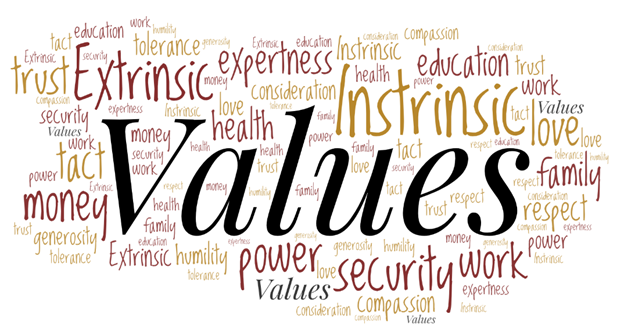The Relevance of Your Values System
Our VALUES define the things we prize the very most in life. They are the ideals that guide us everyday. A value you hold cannot be taken away from you.
A Values System is formed through family and childhood experiences, the folklore of our culture, societal pressures and peer groups, religious education, formal schooling, and people of influence in our life.
A values system can be sorted under two categories: intrinsic or extrinsic:
Extrinsic values, also called instrumental values, serve as a means to an end. Examples include security, expertness, power, education, money, work, family, and health, to name a few. Extrinsic values typically change as we age and move through the stages of life.
Intrinsic values, often referred to as virtues, are prized purely for themselves. They exist within every one of us, natural and inseparable from who we are. They represent the inner character of the person. Intrinsic values or virtues are typically acquired through our early lived experiences and seldom change throughout our adult lives. Unlike instrumental values, intrinsic values are not used as a means to an end. Examples of intrinsic values are respect, trust, love, tact, humility, compassion, generosity, consideration, to name a few.
Values represent the best attributes of the person we want to be. Defining and understanding one's Values System helps contribute to being true to your authentic self. I believe it's fair to say that few of us consider our values system on a regular basis, and perhaps we should. Our intrinsic values, or virtues represent our moral standards, our character strengths. When it feels like they are being compromised it can result in dissonance and inner conflict. And depending on the nature of the issue can contribute to significant personal distress.
It's also important to consider that values and virtues are actionable, so when something doesn't feel right or incongruous behaviour emerges within the context of a personal or work relationship, there's a very good chance that an important value or virtue one holds is being threatened.
Clarifying values can solve the incongruence between who the person thinks they are versus how they "walk their talk" in both personal and professional settings. Knowing, owning, and living true to one’s Values System can be a significant contributor to the complex and deep question — Who Am I? In addition, as we move through life's stages, asking the question Who Am I Now? may help keep us on the path to being true to our essence.
For those of you who love to explore yourselves here are a few links to assessments you may enjoy:
https://viacharacter.org
https://www.authentichappiness.sas.upenn.edu
https://www.psychologytoday.com/ca/tests
Be kind to yourself,
Love Kathleen

